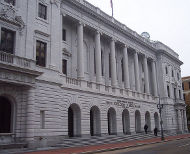2/24/2011
Federal Appeals Court Overturns Wrong-Way Traffic StopUS Court of Appeals for the Fifth Circuit finds driving on the wrong side of the road can be legal.

A police officer in Houston, Texas thought he had a slam dunk case against a motorist he stopped for driving on the wrong side of the road on September 15, 2008. The US Court of Appeals for the Fifth Circuit in a February 10 decision overturned the stop on the grounds that driving on the wrong side of the road is not always against the law.
Just two days before the incident, Hurricane Ike made landfall in Galveston as a category 2 storm. Houston had suffered widespread power outages, looting and gas shortages. On September 15, lines that formed around a gas station at the intersection of Almeda-Genoa Road and Chiswick Road. This caused a major traffic backup that blocked the only road leading out of a subdivision. Motorist Corey A. Raney wanted out, so he drove slowly around the stopped cars by pulling into the opposite lane. Officer Rohan Walker, who was directing traffic in the area, ordered Raney to pull over, and Raney complied immediately. Raney was charged with driving in the wrong lane of traffic, failing to obey a police officer's directions and reckless driving.
Raney's appeal turned on the question of whether driving in the wrong lane of traffic is always a violation of the Texas Transportation Code. The law states that a driver shall drive on the right side of the road unless "the operator is passing another vehicle; ...an obstruction necessitates moving the vehicle left of the center of the roadway and the operator yields right-of-way to a vehicle... or the operator is on a roadway restricted to one-way traffic."
The appellate court majority found that since the right lane of the two-lane road was blocked, it constituted an obstruction allowing Raney's maneuver. The court did not believe, based on the evidence, that prosecutors could prove that Raney should have noticed that Officer Walker was directing traffic. It also disagreed that Raney's actions were reckless.
"Officer Walker testified that he believed Raney was driving recklessly when he pulled into the northbound lane where Officer Walker was standing simply because Officer Walker 'would have been hit' if he had not moved," the majority decision stated. "This argument is specious. Recklessness clearly requires a showing of willful and wanton disregard for the persons or property of others... Officer Walker testified that Raney was driving approximately ten to fifteen miles per hour in a lane with no oncoming traffic."
Because there was no traffic violation committed, the majority held that the traffic stop was invalid. It overturned the lower court's decision to accept evidence that Raney, a convicted felon, had been carrying a .45 caliber Sig Sauer pistol. Prosecutors had relied heavily on this fact to convict Raney on far more serious charges.
"The gun was loaded, a round in the chamber, ready to be fired -- bang, bang, bang," the prosecutor told the jury during closing arguments at trial.
The prosecutor then asked rhetorically why any of the officers would ever risk their careers by lying in court to obtain a conviction. The appellate court found these statements highly objectionable.
"We feel it prudent to address this issue because the government has been cautioned repeatedly by this court against making such arguments, yet we continue to face them on appeal," the majority wrote. "It is troubling to this court that the government made these types of improper remarks in the present matter because the primary inculpatory evidence was the testimony of the law enforcement witnesses whose credibility was bolstered by the prosecution... Despite our precedent clearly condemning such remarks, the government continues to disregard our admonishments."
Judge Fortunato Benavides dissented, arguing that "an ordinary traffic jam" does not necessitate driving on the wrong side of the road. A copy of the decision is available in an 80k PDF file at the source link below.


